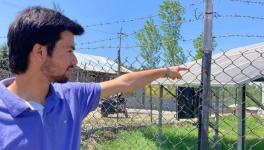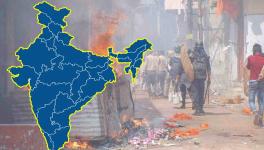Fear of Virus, Lockdown and Police Excesses Take Toll on Mental Health of Kashmiris, Say Experts
File Photo.
Srinagar: An unprecedented global crisis, prolonged isolation due to lockdown, and consistent violence is crushing the mental health of Kashmiris like never before, warn experts as the region grapples with the COVID-19 outbreak.
The region has been put under a strict lockdown since March 22, two days before Prime Minister Narendra Modi announced a national lockdown throughout the country. Mental health experts in Kashmir claim they have witnessed higher relapses in patients with psychiatric issues since the first cases of novel coronavirus were reported in Kashmir.
"The mental health issues like anxiety, stress, depression are more likely to worsen in any crisis like the current pandemic situation," says Dr Sheikh Shoib.
Dr Shoib works as a consultant neuropsychiatrist at Srinagar's Jawahar Lal Nehru Memorial (JLNM) Hospital and is part of a team of mental health experts who are running a helpline for psychological care from the initial days of the outbreak. The helpline receives between 30 to 40 calls everyday during the working hours and all treatment is provided on calls or through instant message services or social media.
The lockdown has come after the region witnessed a severe clampdown enforced by the government on August 5 last year as Article 370 was revoked resulting in an unprecedented crisis that lasted for months. The situation was worsened by a communication blockade due to which high-speed internet continues to remain out of bounds for the locals.
In Kashmir, however, people are not just battling the invisible virus, there is an invisible sword of violence hanging on people's heads even when locals are observing mandatory social distancing and staying inside their homes.
On April 7, at around 7 pm, security forces raided village Karimabad in South Kashmir's Pulwama district. The forces were agitated as they witnessed anti-India graffiti and similar imagery painted on a roadside block near Shaheed Park. The security forces, however, according to eye-wittnesses, beat up members of a group of families living in the park vicinity.
"We are terrified and there is not a single moment where I have personally felt safe since then. We were beaten mercilessly with batons and some of my family members are in a state of shock," a family member told NewsClick, who wished anonymity fearing reprisal.
Due to the political turmoil, Jammu and Kashmir does not fare well on the mental health index. A survey by Médecins Sans Frontières (MSF) in 2015 said that 45% of the adult population has shown symptoms of mental distress and over 41% of the population showed signs of depression, 26% signs of anxiety and 19% showed probable symptoms of post-traumatic stress disorder (PTSD).
The Kashmir valley has been mired in violence, repression and lockdowns -- a quagmire of trauma.
"During any crisis situation, the chances of relapses among patients are higher and we live in a conflict-torn society which makes it worse," Dr Shoib pointed out.
Mental health experts, however, also claim that the experiences of people in the region have made them more "resilient".
"A resilience is already developed in most people here and since people are accustomed to lockdown, the situation is much better than in places where people are being exposed to such a situation for the first time," a clinical psychologist at Shri Maharaja Hari Singh (SMHS) hospital, Dr Aijaz Khan,W says.
The experience, Dr Khan says, has also helped the mental health professionals in the region to develop a response mechanism for psych care. Dr Khan attends patients daily on phone and on WhatsApp and this is not the first time Dr Khan and his colleagues are treating patients remotely.
"In mental health-related issues, we usually advise increased social interaction, but, this time people are being advised to maintain social distancing so it is altogether a different situation," Dr Khan says.
Four persons have died and over 200 have been confirmed positive for the coronavirus disease in the union territory of Jammu and Kashmir. The virus, which originated in China's Hubei province, has claimed over 1 lakh lives globally and infected over 16 lakh people worldwide. With healthcare systems failing to respond to the unprecedented crisis, a global lockdown is being observed to stop the spread of the disease.
In Kashmir, the lockdown has been strictly imposed and in many cases, people have alleged unnecessary and excessive use of force by the police and security forces to restrict the movement. Along with the fear of spread of the pandemic, another fear lingering in people's minds is the police action on the streets.
In the backdrop of conflict and the pandemic, experts say, despite their resilience, people in the region are experiencing stress at multiple levels.
"Besides, we are not just dealing with the fear of pandemic but also with the pandemic of fear," Dr Shoib says.
The fear that increases stress levels.
The employees of the J&K's Excise Department highlighted harassment on streets by security officials as they "begged" a senior official to suspend work till the COVID-19 threat subsides.
Fear also spread in the Sales Tax Department as one of the employees was suspected of having contracted the virus, and despite that, the employees were asked to report for duty.
"These officers come and go in government’s official cars, but we, the middle-rung staff members have to come on foot or scooter as no matador (public transport) service is available. We have to face a lot of harassment and sometimes abuses and sticks at police nakas," the employees alleged in a letter to another official.
The repercussion of any traumatic experience, Dr Shoib says, is not immediate in all cases. "It's like a plant which then takes time to grow into a full-grown tree. It may start with small mental health issues before a mental health disorder is developed," he says.
Also read: ‘Never Felt This Lonely’: J&K Healthcare Workers Face
Get the latest reports & analysis with people's perspective on Protests, movements & deep analytical videos, discussions of the current affairs in your Telegram app. Subscribe to NewsClick's Telegram channel & get Real-Time updates on stories, as they get published on our website.
























